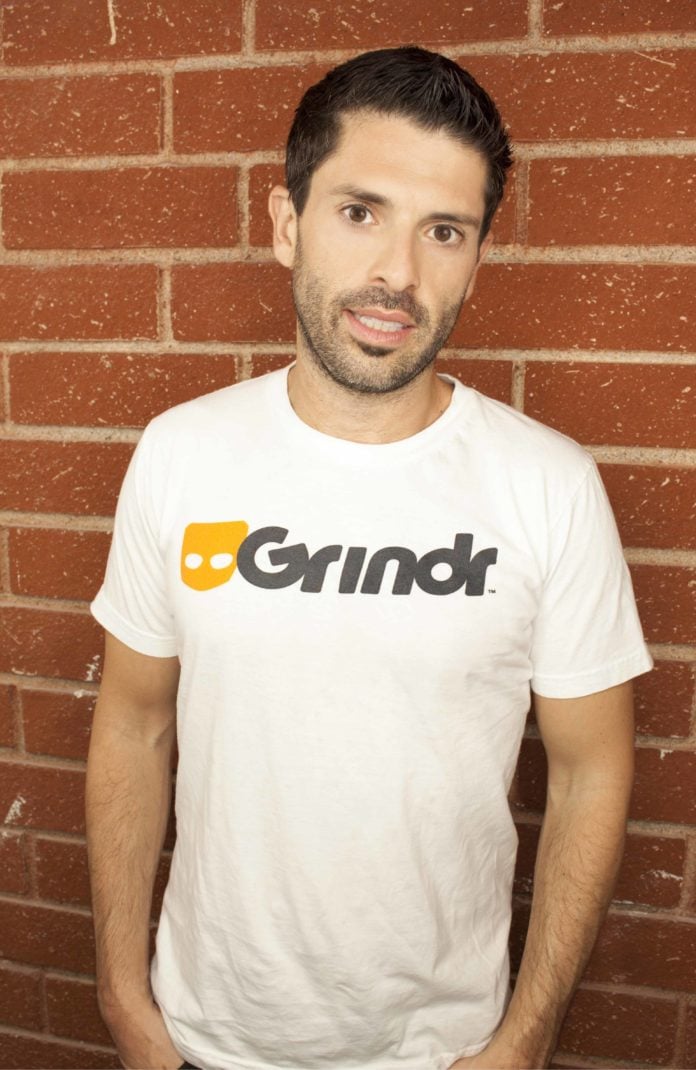Joel Simkhai calls himself the “number one Grindr user.” He’s also the gay dating app’s chief executive.
Grindr celebrated its fifth anniversary earlier this year, a milestone not many startups live to see. And while the mobile dating space has gotten more saturated, Grindr still grinds on with 5 million active monthly users, 30 percent of whom engage with the app every day. An average user spends 45 minutes a day on the app, which relies on real-time geolocation tools to show nearby gay men.
It’s a level of engagement that advertisers salivate over, which has helped Grindr turn a pretty penny without outside investment. Seventy-five percent of the Hollywood company’s revenue also comes from subscriptions, though Simkhai declined to share the profitable app’s annual run.
Now, the 42-person team is looking to hire more engineers and developers to help handle the app’s growing numbers. Simkhai talks how business – and the gay community – is alive and thriving.
How has the business changed?
In the early years, we worked out of my house. Three years ago, we moved to Hollywood Boulevard and Highland Avenue. We’ve matured and grown to quite a great team of folks here. As I think about Los Angeles and the ecosystem of what’s going on here, in my perspective, we’re one of the largest in the L.A. region in terms of users and app usage for a company of our size.
Grindr in the past has said it’s completely self-financed. Still true?
Since day one, we haven’t raised capital. Quite frankly, we haven’t had to. We generate our revenue from two sources. One is from Grindr Free, which is a free download. It’s ad supported. There are two types of ads. One is sold by our in-house team, which tend to be local ads so we have the ability to drive traffic to local businesses. Then we also work with third party networks that sell our inventory that we don’t sell totally. Grindr Xtra is our subscription service, $10 to $12 a month, and you get a high level of service like a map with no ads. Between those two revenues, advertising and subscription, we’re able to fund the business.
Why not include outside investors if only to tap into their know-how or get access to their Rolodex?
It lets us focus on what’s important: our users. If we don’t need the money, then there’s no compelling reason to raise capital. It brings distractions. You have to give up equity in your company.
There are so many dating apps these days. In particular, Tinder has taken off and become a mainstream way to meet someone. How are you competing with emerging dating apps?
We’re a gay-led company that is producing a gay product. That’s what we do very well. We’re almost a chat messenger more than we are a dating service. We’re all about real-time conversations. We’re optimized around meeting so the goal is to meet someone who’s nearby as quickly as possible and see what happens. Grindr is very much meant to be fast and easy. I think that’s in position for what gay men are looking for. These other companies, they do a great job in catering largely to women. And I think we do a great job catering to gay men.
With more than 2 million active monthly users, the United States far outranks other countries in terms of app usage. In second place is the United Kingdom, which has a third of that number. What’s being done to better reach the international gay market?
Historically we haven’t done much paid marketing. That’s something we’re going to start doing this year in the United States and also abroad so that’s going to help us grow our user base. IPhone and Android penetration continues to increase across the world. The more smartphones that are out there, the more users we could have.
Some countries have imposed anti-gay legislation. How does Grindr operate then?
When you look at Grindr, you can see how far away a user is to the foot. But in some countries, we’ve hidden that information. You wouldn’t be able to see how far someone is. That’s a change we’ve made to help the security and safety of our users abroad. But overall, it’s a very similar experience. More than 70 countries have anti-gay laws. Fortunately we’re available in almost all of them.
Where have you met resistance?
We’ve been blocked in Turkey. It’s one of the few countries we’re blocked. They also blocked Twitter. Very unfortunate.
Five years is a long time in the startup world. Where does Grindr go from here?
For us, the question we ask is how do we make this experience faster, how do we make it easier and how do we make it more fun? How do we make the meeting process better? Why Grindr has achieved the level of success we have is that we solved a very big problem for the gay man, and we did it in a very elegant and easy way. What other problems can we solve for the gay man?
Staff reporter Melissah Yang can be reached at [email protected]. Follow her on Twitter @MelissahYang for the latest in L.A. tech news.

